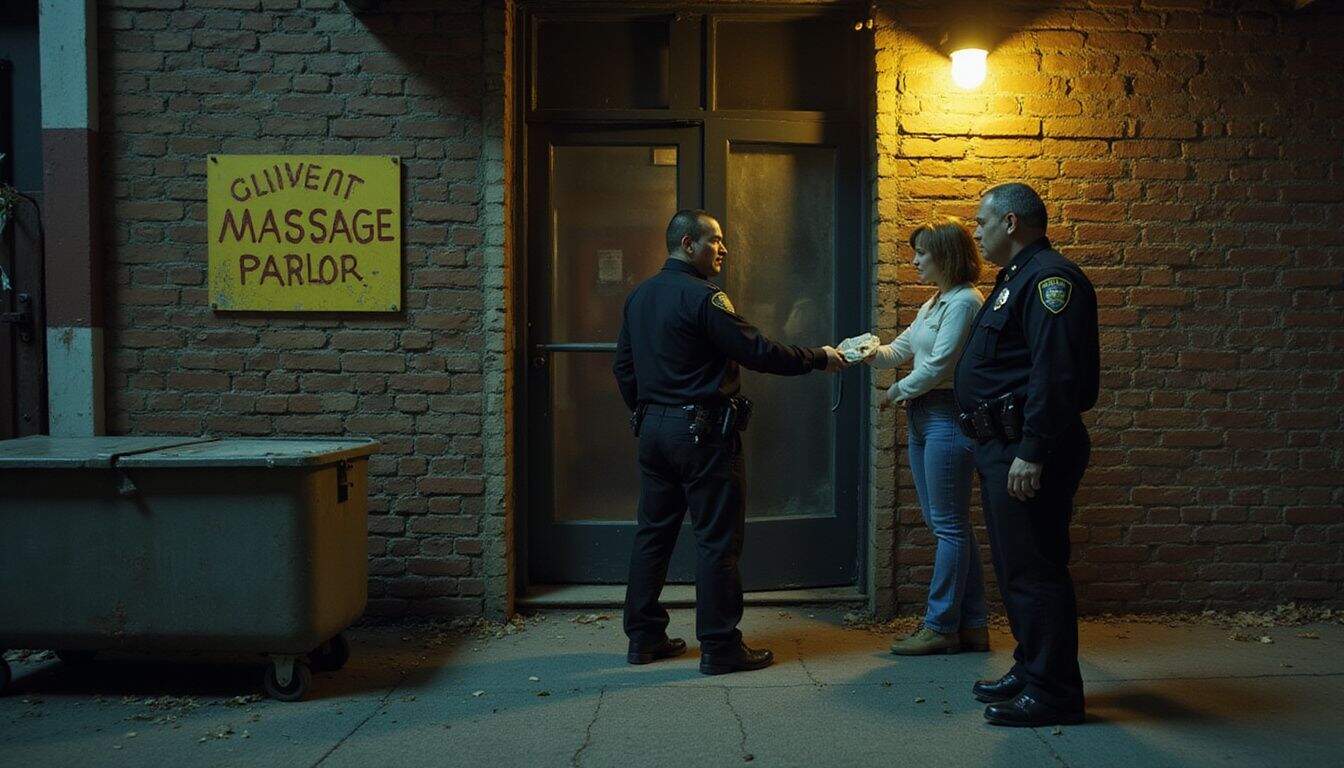You’re probably worried about how to not get busted at a massage parlor and avoid trouble with law enforcement. Police typically target owners rather than customers in their fight against sex crimes and human trafficking.
This guide gives you clear tips on how to stay safe, protect your privacy, and know your rights if officers ever ask questions. Stay informed and stay free!
Key Takeaways
Always verify that a massage business has valid licenses and permits—legitimate spots usually display these certificates openly near the entrance or front desk.
Prefer paying with cash instead of a credit card to maintain your privacy; digital transactions can leave trails connecting you with troubled businesses later.
Look out for suspicious signs, such as hidden entryways, windows covered completely, or prices far below average—these hints can signal shady activity.
If police approach you, stay calm, don’t speak, and immediately request a lawyer; simply being in a massage business isn’t sufficient cause for arrest.
Do some homework online ahead of your visit, checking customer reviews carefully for coded terms like “extras” or “happy endings”, since these phrases often point to illegal offerings.
Table of Contents
Understand the Risks

Going to the wrong massage place can land you in jail with a criminal record. Police use tricks like hidden cameras and undercover officers to catch people looking for illegal services.
Legal implications

Getting busted at an illegal massage parlor can land you in serious legal trouble. Customers who pay for sexual services may face misdemeanor charges—even if they insist they weren’t aware of the illegal activity.
Often, police use undercover sting operations to target these businesses, posing as customers or massage therapists. Prosecutors can file charges months later, thanks to extended statutes of limitations.
During police raids, anyone inside risks questioning or arrest, particularly if officers catch them soliciting. Although courts must prove guilt beyond reasonable doubt, solid evidence like surveillance tapes and credit card records can make conviction easier.
Your legal rights matter greatly in these cases. Officers must have probable cause to make an arrest, and you always have the right to remain silent during questioning. Many defendants choose plea deals to avoid trials—but these agreements usually come with fines, probation periods, or even sex-offender registration.
While law enforcement typically prioritizes business owners tied to sex trafficking rings, customers aren’t immune from charges. If you appreciate how massages feel good, always choose licensed, legitimate providers that follow state guidelines and regulations.
Common law enforcement tactics

Police use several tactics to target illegal massage businesses. Often, officers set up sting operations—pretending to be clients—to collect proof of wrongdoing. Officers must have probable cause before making any arrests; simply being inside a massage parlor isn’t reason enough to act.
Typically, law enforcement observes cash payments closely rather than waiting to witness criminal acts firsthand. Many police departments still prefer traditional methods like quick response teams or reactive policing to handle suspected prostitution or human trafficking cases.
The burden of proof falls on law enforcement to establish criminal activity beyond a reasonable doubt.
Authorities frequently order business shutdowns as soon as they gather evidence of unlawful sexual activities. Often, undercover operations last several weeks, allowing officers to note repeated behaviors that show illegal activity beyond standard massage services.
Knowing your rights can help—especially understanding your protections against entrapment and your right to stay silent if officers question you. Cash payments remain tougher for police to trace compared with credit card purchases, which leave digital records behind.
Research the Establishment

Smart research can save you from legal trouble. Check if the massage business has proper permits and read what past clients say online.
Verify licensing and credentials

Always confirm a massage business has proper licensing before heading there. Legitimate massage centers display state-issued certificates openly, usually near the front desk. These documents list certified therapists who finished required training hours.
You can verify a business easily through your city’s health department site or by simply calling them. Taking this quick step can protect you from places involved in illegal activity.
Law enforcement must have probable cause to arrest individuals, so choosing licensed businesses reduces your risk of being caught in undercover stings.
Fake massage parlors usually lack proper licenses or have outdated permits. They might display generic certificates that don’t match employee names or meet local standards. Careful clients spend a few minutes checking online databases about the parlor and its massage therapists.
The massage industry has clear guidelines about who can legally offer services. These rules help protect you against legal issues and low-quality service. Paying cash at a licensed massage business stays completely normal—it won’t cause any suspicion or problems.
Check online reviews and forums

Sites like RubMaps and USASexGuide can reveal important details about massage businesses. Savvy visitors check reviews on these forums before heading to a new location. Pay close attention to hidden phrases or coded words in user comments, such as “extras” or “happy endings”.
These subtle terms often indicate places offering illegal services beyond regular massages. Spots with multiple comments mentioning those extras tend to attract police attention sooner or later.
Legal experts from JustAnswer confirm that law enforcement regularly watches these online platforms to prepare sting operations.
Knowledge is your best defense against legal trouble.
Forums can also highlight establishments tied to criminal acts, including prostitution or human trafficking. Watch out for user reports about recent police activity or frequent arrests.
Places taking cash-only, operating at odd late-night hours, or having covered windows usually deserve increased caution. Before checking out somewhere new, I do a quick search of the business name with words like “arrest” or “sting”.
Spending five short minutes online can protect you from heavy legal trouble and keep you clear of shady spots involved in dangerous activities.
Recognize Warning Signs
Spotting warning signs can save you from legal trouble at massage parlors. Red flags include odd pricing like “$60 for 30 minutes plus tip” or places with blacked-out windows and back-door entrances.
Suspicious pricing structures

Massage businesses offering strangely low prices often point to illegal activities. For instance, an hour-long massage priced at only $30-40 could mean the place skips proper licensing—or offers something beyond therapeutic services.
Police recently raided a Vermont massage parlor after noticing rates at about half the going local rate. That suspicious discount grabbed the attention of law enforcement agents during months of undercover monitoring.
Illicit establishments often rely on confusing tips or vague menu terms like “happy ending” or “full service”. Odd pricing structures—like changing fees depending on the client’s gender or who provides treatment—also signal shady operations.
Legal massage therapists keep prices steady and transparent no matter the therapist or customer. Moreover, legit businesses usually take several payment methods and provide clear receipts, unlike illegal shops operating strictly in cash with no proof of payment.
Paying attention to these types of details—such as shifting prices or vague service descriptions—can keep you safe from accidentally entering places under investigation and avoid possible legal issues involving a criminal defense lawyer.
Overtly discreet or hidden entrances

Real massage places keep their doors and entrances open and visible. If a spa has hidden entries, covered windows, back-alley doors, or requires buzzing to get inside—it’s probably not legit.
I visited a spa once for an authentic massage and quickly saw the difference firsthand. Trustworthy businesses have obvious signs, clear windows, and unlocked front doors. A locked or hidden entrance can point to illegal activities, raising your risk of criminal charges like solicitation of prostitution.
The entrance tells you everything you need to know about what happens inside.
Dishonest massage establishments often hide from law enforcement by operating secretly. Some places have hidden doors, no signs, or even secret code words for entry. Doing this makes it harder for police to spot them, helping these businesses run prostitution rings unnoticed.
Your safety and freedom matter too much to risk walking through hidden entrances. Massage locations using these secretive tactics likely engage in sex-related crimes, and you could end up with serious legal trouble.
Inappropriate advertisements
Hidden entrances often hint at another warning sign: questionable ads. Legitimate massage businesses steer clear of suggestive images or promises of “happy endings” in their marketing materials.
Phrases like “young girls”, “new staff”, or “special services” in an ad can signal possible illegal activity—these are typically codes that police already recognize.
Be cautious about flyers or online listings featuring barely clothed women, or wording with hidden meaning. Shady parlors frequently advertise on adult-oriented websites instead of respected massage directories.
Another red flag? Application forms asking about past arrests tied to massage services. Using common sense about such advertisements can save you from serious legal trouble, including criminal charges that could force you onto a sex offender registry.
Behave Appropriately During Your Visit

Your actions at a massage place matter more than you think. Smart clients stay calm and act normal during their visit to avoid any trouble.
Avoid suspicious or suggestive behavior

Always stay respectful and professional during massage appointments. Never request sexual favors or hint about anything inappropriate. Speak clearly, use confident body language, and make it obvious you expect strictly lawful treatment.
Avoid slang and any phrases that imply illegal intentions. Massage therapists quickly notice if a client acts nervous or uses suspicious language.
The difference between freedom and trouble often comes down to how you conduct yourself in the first five minutes.
Keep yourself covered properly with the towels or sheets given to you. Do not remove more clothes than needed, and never touch the therapist improperly. If you become aware of anything illegal occurring, immediately inform the correct authorities.
Reporting illegal actions helps curb harmful massage businesses, making communities safer for everyone. Next, we’ll cover essential tips for respectful behavior during your entire massage experience.
Maintain professional and respectful conduct

Staying respectful to your massage therapist helps establish genuine trust—it’s that simple. View them as healthcare providers rather than hired help. Speak politely and softly, keeping conversation respectful through your entire appointment.
Many legal problems begin with clients behaving rudely or making staff feel uneasy.
Being on time matters a lot too. Showing up promptly respects your therapist’s time and schedule. Afterward, tipping between 15% and 20% is standard practice to thank therapists for quality service.
Proper tipping also sets real massage businesses apart from shady operations. Staying calm and courteous builds a healthy connection and keeps both you and your therapist safe from potential legal issues.
Be Aware of Sting Operations

Police run sting operations in massage parlors all the time. You need to watch for signs like new staff asking direct questions about extra services or rooms with recording devices.
Indicators of undercover operations

Undercover officers often reveal themselves through subtle slip-ups. They might rush to discuss “extra services” or use strange phrases typical of law enforcement. One time, at a massage place, the supposed “masseuse” kept pressing me to say if I wanted anything illegal—that was a huge red flag.
Sting operations happen because undercover officers pretend to be regular customers. Their main goal is to catch people breaking prostitution laws. These fake clients might eagerly talk money or insist on clear statements about sexual services.
Sometimes, they secretly record these conversations to build criminal cases. Odd questions about your previous visits or other massage businesses can also warn you of trouble ahead.
Always pay attention to your instincts if someone seems too interested in illegal acts—authentic customers won’t speak like that.
How to identify potential traps

Recognizing a potential trap is about more than spotting hidden officers. Many setups start with deals that sound way too cheap or unrealistically good. For instance—a massage offered at prices much lower than usual market rates can indicate a police operation.
Staff who immediately suggest additional services might also be working directly with law enforcement. Also, watch how other customers behave in the business—like if the waiting area only has single men, who seem uneasy or anxious—that can hint at trouble.
Listen closely to your instincts whenever things feel strange or off. Odd discussions about money for specific sex acts often signal a sting. Workers who mention exact legal wording or directly ask about paying for sexual favors might be secretly collecting evidence.
Real massage therapists center their services on health and wellness, not sex-related activities. Attorneys strongly recommend leaving any location at the first indication of illegal business.
Staying quiet becomes vital if you think you’ve entered a police trap.
Protect Your Privacy

Your privacy matters more than you might think at massage places. Smart clients pay with cash and give fake names to stay off the radar.
Avoid sharing unnecessary personal information
Massage parlor staff don’t need your whole biography. Share only basic details necessary for the service—nothing extra. Don’t mention specifics about your job, exact address, or daily routines.
Data thieves often target relaxed settings, counting on customers sharing private information. Keep secret details, like your childhood street name or first pet’s identity, completely to yourself.
Use cash rather than cards, which leave digital records behind. Credit card statements can tie you directly to businesses later involved in legal issues. Many established spas gladly accept cash and won’t ask unnecessary questions.
It’s also essential to know your legal rights clearly, just in case law enforcement ever approaches you.
Use cash instead of traceable payment methods
Cash payments offer complete privacy at massage parlors. Paying with credit cards, digital wallets, or checks leaves behind a clear financial record linking directly to you. My friend learned this the hard way after his wife noticed a strange spa charge on their joint credit card bill—it led to some awkward conversations at home.
Many legal issues start with digital payment records that show exactly where you went. Cash, on the other hand, leaves no electronic trail for authorities to trace if there’s ever an investigation.
Taking this simple precaution can help protect your attorney-client privilege if legal challenges pop up.
Using paper money also keeps your personal details secure. Most massage businesses track payments in customer records, including card details. These payment records could later become evidence in criminal cases if the business faces legal trouble.
Cash transactions skip the need for your ID and signature, leaving no permanent link between you and the spa. Good privacy habits mean considering what might happen later with your payment details—and taking the easy route to keep sensitive info private.
Know Your Legal Rights

Knowing your rights can save you from legal trouble if you face questioning at a massage parlor. You need to stay silent and ask for a lawyer right away if cops start asking tricky questions.
Understanding consent and entrapment laws
Consent laws differ from state to state—but one guideline stays the same everywhere. Police must have probable cause before they can legally arrest you. Simply walking into a massage place isn’t enough to warrant arrest.
But officers sometimes set traps by encouraging you to request illegal services. These setups, known as sting operations, catch many people off-guard. Men often get caught by using careful wording they mistakenly think protects them.
Still, police can’t persuade you to commit a crime unless you had already planned to break the law. Such protection, called entrapment defense, applies across most states, although exact details differ depending on where you live.
Your legal rights matter greatly if police approach or question you. You have the right to remain silent and immediately request a lawyer. I once talked with a criminal defense lawyer who explained how speaking too openly often hurts a client’s case.
While the penal code shields you from unfair police tactics, these protections only help if you’re aware of them. Paying with cash—and avoiding sharing unnecessary personal details—makes it tougher for the authorities to wrongly accuse innocent customers who genuinely sought lawful massage services.
What to do if questioned by law enforcement
Knowing your legal rights gives you confidence when dealing with police questions. If the police approach you inside a massage establishment, stay calm and polite. You have the right to stay silent to protect yourself—use that right! Clearly state, “I want to speak with a lawyer before answering any questions”.
Officers must have probable cause to arrest someone; your mere presence isn’t enough. Too often, people panic and start talking, causing trouble for themselves. I once watched a friend talk excessively and land himself in serious trouble.
Officers recorded each word he said, then later used his statements against him. If possible, avoid carrying identification with your actual name on it. Always pay cash. Criminal defense lawyers regularly confirm that silence remains your strongest defense against incriminating yourself.
Words you say can easily become damaging evidence—faster than most people realize.
How Will These Precautions Evolve in 2025?

Massage industry regulations will tighten up significantly by 2025. Law enforcement will increasingly rely on advanced tech tools to identify illegal massage parlors, meaning old safety guidelines won’t cut it anymore.
Genuine establishments will prominently display their licenses, clearly setting themselves apart from shady competitors. Many massage businesses will also shift toward digital verification methods—these systems verify customer backgrounds, without sharing private details.
This industry-wide change matches growth in wellness therapies like cupping—which helps improve blood flow and ease muscle tension.
States will impose stronger legal standards, including tougher penalties for solicitation and involvement in sex trafficking activities. Paying in cash could soon cause suspicion, since digital payments will quickly become the norm.
Careful customers will need to thoroughly research massage businesses, making sure therapists have proper training in specialty treatments such as lymphatic drainage. The boundary separating legitimate massage services from illegal activity will grow clearer, so careful awareness of consent laws and proper behavior during appointments will become essential.
People Also Ask
What legal risks do I face if caught at an illegal massage parlor?
You might face charges such as solicitation, pandering, or lewd behavior. Penalties often include heavy fines, jail sentences, and sometimes mandatory sex offender registration—especially in states like California or Missouri. If arrested, make sure you immediately talk to a criminal defense lawyer licensed in your state.
Should I talk to police if questioned about visiting a massage parlor?
No—stay quiet and politely ask for an attorney right away. Police can use any statement you make against you, so it’s best to remain silent until your lawyer arrives.
What makes a massage parlor illegal?
Massage parlors become illegal if they’re used as covers for prostitution, human trafficking, or sexual exploitation. These places rarely hold legitimate licenses and often have ties to organized crime or human trafficking groups.
Can I be charged with a felony for visiting a rub and tug?
Yes, felony charges are possible, especially if the establishment involves pimping or prostitutes younger than 18. Crimes involving minors can bring severe prison time, substantial fines, and mandatory sex offender registration.
How can bail work if I’m arrested at a massage parlor?
Bail depends heavily on the charge and your criminal record. Minor misdemeanors might involve bail amounts around a few thousand dollars, but felony charges linked to prostitution or trafficking typically result in much higher bail sums.
What should I do immediately if arrested?
Stay calm and cooperate—don’t argue or resist arrest. Plea bargains can come later, but your main priority should be contacting a qualified criminal defense lawyer authorized to practice in your state.
References
https://www.justanswer.com/criminal-law/pz2i1-went-massage-parlor-few-days-ago-not-sure.html
https://www.tandfonline.com/doi/full/10.1080/07418825.2022.2051587
https://www.justanswer.com/law/i9q8g-texas-person-visited-parlor-months-ago.html
https://www.sbwlaw.com/blog/6-red-flags-to-watch-for-at-massage-parlor-or-spa/ (2022-04-27)
https://mginjuryfirm.com/massage-parlor-human-trafficking/ (2024-12-18)
https://www.ncbi.nlm.nih.gov/books/NBK430910/
https://themassagebusinessmama.com/how-to-protect-yourself-from-illicit-massage-requests/
https://www.massagesolutions.me/blog/proper-behavior-and-etiquette-when-receiving-a-massage
https://www.nedbarnett.com/common-prostitution-sting-tactics-in-texas/
https://www.getcybersafe.gc.ca/en/blogs/how-avoid-sharing-too-much-information-online
https://www.patientcalls.com/blog/how-to-stay-hipaa-compliant-as-a-massage-therapist/ (2024-07-25)
https://cybernews.com/resources/the-ultimate-guide-to-safe-and-anonymous-online-payment-methods/ (2023-12-12)
https://www.justanswer.com/criminal-law/53ons-proof-does-law-enforcement-need-arrest-cite.html
https://www.justanswer.com/criminal-law/cfiro-someone-visited-illegal-massage-parlor-months-back.html (2019-05-25)
https://clinicsense.com/blog/the-future-of-massage-therapy-2025-top-trends

